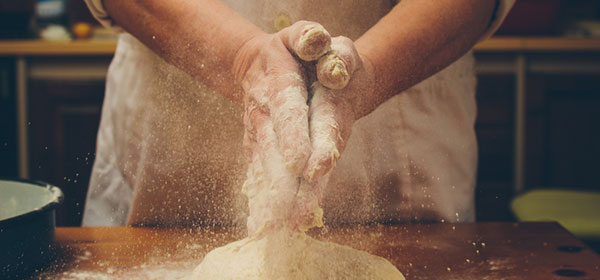Rosemary loves to cook and is passionate about food. When she travels, she likes to do at least one cooking class in the country she visits. Cooking classes don’t just give you the skill to replicate the dishes you have enjoyed when you get home, they often give a great insight into the culture and history of the country.
•••
We’re staying in the walled city of Montepulciano in Tuscany and I’ve signed up for a cooking class at Villa Ciccolina, just outside the city. While waiting in the lobby of this boutique hotel some guests arrive, part of their check-in process is to advise whether they will be eating in the restaurant this evening. The offering is a three-course dinner for the price of €63 a head. Most of the guests opt in and the dinner of classic Italian dishes looks very appealing.
Once the guests head off to their rooms I’m taken to the restaurant kitchen for the class. First things first, I ask where I can wash my hands before starting. The other two attendees arrive and, when told where the bathroom is (for handwashing) announce they don’t need to go to the toilet. I gently suggest they may want to wash their hands before we start, which is met with somewhat frosty acquiescence.
The cooking classes only allow for a maximum of four students, which is great because it makes for a very ‘hands-on’ experience and a chance to participate in the preparation of every dish. The chef speaks very little English and the hotel receptionist flits in and out between her other duties to act as translator. Luckily, the language of food and cooking is fairly universal and easily demonstrated.
Having taken a sneak peak at tonight’s menu for the restaurant it rapidly becomes clear that we are cooking for the hotel guests. The class is €100 and the hotel is charging guests €63 to eat the food we prepare under the watchful eye of the chef. This makes very sound economic sense for the hotel, but I am not sure what the guests would have thought had they known who their cooks were for the evening’s repast.
The menu consists of ribolitta, a traditional Tuscan soup of tomatoes and stale bread; duck breast with honey and orange, and panna cotta for dessert. As we commence the class, the reluctant hand-washer’s nose starts to drip and she begins to sniff, periodically wiping her nose with her hand and then continuing to cook. It’s at this point that I decide not to stay for dinner.
The class itself was great fun; the chef was lovely and the soup and method of cooking the duck breast are techniques I have since used often. We were also shown how to make fresh pasta dough and the method for creating several different shapes and sizes of pasta.
Despite the exhortations of the receptionist, I declined to stay for dinner. I didn’t think I could enjoy the food knowing the added ‘ingredient’ that went into every dish!
Have you ever taken a cooking class in another country? Would you recommend it to our members?
Related articles:
Things that will surprise cruisers
Cooking classes with Captain Arjen
Tuscan night at the Opera

